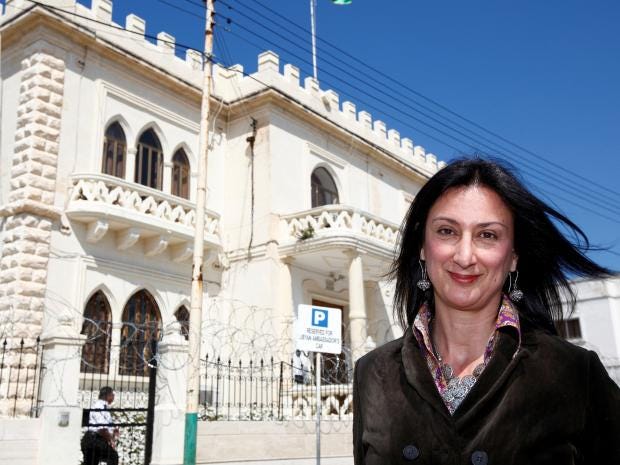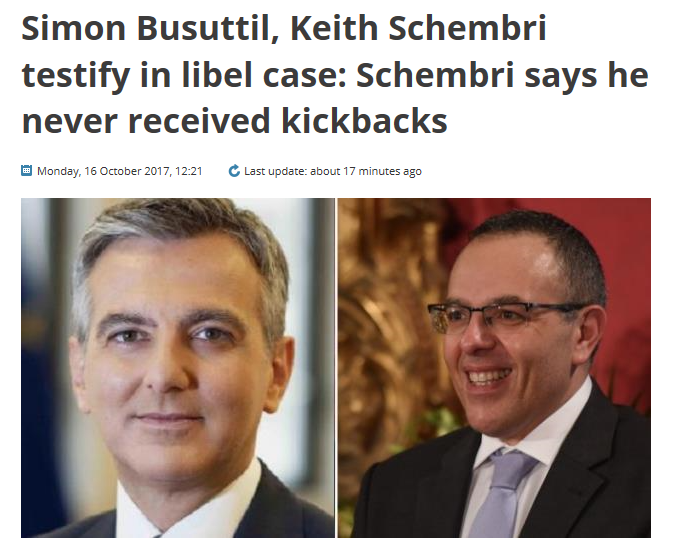Just see how close our criminal ex-PM John Key with his secret trusts is to this criminality.
Hours after writing this the author was killed by a car bomb in Malta.
Cui bono? Who benefits, one asks.

'There are crooks everywhere you look now, the situation is desperate,'

Daphne Caruana Galizia: Top investigative reporter killed by car bomb in Malta
'There are crooks everywhere you look now, the situation is desperate,' journalist wrote shortly before her death

16 October, 2017
A prominent journalist who played a major role in the Panama Papers case has been killed in Malta.
Daphne Caruana Galizia, whose investigative work focused on corruption, was killed when a car bomb blew her vehicle to pieces.
A politician said her death marked the “collapse of the rule of law” in Malta, the smallest in the European Union.
Tributes to Galizia poured in on Monday evening, as thousands of Maltese gathered in the streets for a candlelight vigil to the reporter.
"There are crooks everywhere you look now,” she had written, “the situation is desperate."
Soon after driving away in her Peugeot 108, Galizia’s vehicle exploded with such force it was sent flying over a wall and into a field.
Galizia reported death threats against her to the police just over two weeks ago, according to local media.
Her in-depth reporting made her many enemies, including the Prime Minister, opposition politicians and members of the judiciary.
She was described as a “one-woman Wikileaks” by Politico and her blog sometimes achieved a larger readership than all the other newspapers in Malta combined.
The death was described as a “political murder” by opposition leader Adrian Delia.
He said: “What happened today is not an ordinary killing. It is a consequence of the total collapse of the rule of law which has been going on for the past four years.
"We will not accept an investigation by the Commissioner of Police, the Army commander or the duty magistrate, all of whom were at the heart of criticism by Caruana Galizia."
Her husband, Peter Galizia, has also requested magistrate Scerri Herrera is be excluded from the investigation because of previous spats with the dead journalist.
Prime Minister Joseph Muscat, while acknowledging Galizia as one of his “harshest critics on a political and personal level", denounced the "barbaric attack" as "unacceptable".
He said the violence was a "barbaric attack on press freedom".
Mr Muscat was a significant target of Galizia’s reporting. After analysing the leaked Panama Papers documents, she accused his wife of owning a suspicious offshore of a company in the Central American country.
Both Mr Muscat and his wife denied the accusations and sued Galizia earlier this year.
Shortly after her death, Mr Muscat announced FBI experts would be helping the investigation.
The murder sent shockwaves throughout Europe and politicians and journalists sent their condolences.
European Parliament President, Antonio Tajani, described the murder as “brutal” and said: “Tragic example of journalist who sacrificed her life to seek out the truth. She won’t be forgotten.”
Frans Timmermans, Vice-President of the European Commission, tweeted: “Shocked and outraged by murder of journalist Daphne Caruana Galizia. If journalists are silenced, our freedom is lost.
Reporters Without Borders (RSF), a press freedom watchdog, also released a message condemning the killing.
Malta ranks 47th on the organisation’s World Press Freedom Index – above Japan, Italy and Israel.
RSF noted Galizia’s bank account was frozen following her revelations about alleged government corruption
Galizia was murdered within hours of posting the following
Former Opposition leader Simon Busuttil testified in court this morning, as did the Prime Minister’s chief of staff, that crook Keith Schembri, in the case he himself brought against Dr Busuttil for libel damages.
Mr Schembri is claiming that he is not corrupt, despite moving to set up a secret company in Panama along with favourite minister Konrad Mizzi and Mr Egrant just days after Labour won the general election in 2013, sheltering it in a top-secret trust in New Zealand, then hunting round the world for a shady bank that would take them as clients.
(In the end they solved the problem by setting up a shady bank in Malta, hiding in plain sight.)
His government salary is just peanuts to him, Mr Schembri said, because he has retained his companies and his shares and that is where he makes his money. But the way he is using his government influence to benefit his private business in Malta is entirely a separate corruption/trading in influence issue and is not an argument in his defence.
He also said that he was unable to reply to the corruption accusations in the past two years – but it hasn’t been two years – because of a “medical condition”. Would this be the medical condition that they claimed he didn’t have, when the Prime Minister’s chief of staff disappeared for months, I wondered why, found out, and then reported on it?
There are crooks everywhere you look now. The situation is desperate.

Last year Daphne Galizia was interviewed by Kathryn Ryan of RNZ
New Zealand's role in massive tax haven leak
Millions of documents from a Panamanian law firm show how the world's rich and famous, including world leaders, hide their money offshore - including setting up foreign trusts in New Zealand to avoid paying tax. The papers reveal the Maltese Energy Minister Konrad Mizzi, and the Prime Minister's Chief of Staff, Keith Schembri, have set up trusts in New Zealand which under our laws do not have to pay any tax on their Panama income. The revelations have caused a political storm in Malta. Nine to Noon speaks to Malta Independent columnist Daphne Caruana Galizia. Professor Craig Elliffe from Auckland University's business school explains how New Zealand laws have allowed people overseas to use local companies to avoid paying tax.
Listen to the podcast HERE
Sibel Edmonds reveals that there is far more involved in this than just money laundering and the Panama Papers.
When the Panama Papers came out last year I did the following item. Of course the investigation in this country (apart from the great work done by Nicky Hager) was mostly pretty shallow and John Key allowed to get away with his criminality without being brought to account.
Now he has resigned as PM, wthdrawn from Parliament, sold his home in Auckland and is now God knows where.
Here is some more media coverage of the Panama papers
Why, out of all the rotten, corrupt and unprincipled nations of the earth, did the Panama Papers hacker single out New Zealand’s John Key for special mention?...
Hacker “John Doe”, who has now released his “manifesto” of why he hacked Panama law firm Mossack Fonseca, only mentioned one world leader in this explanation – John Key – who he noted “has been curiously quiet about his country’s role in enabling the financial fraud Mecca that is the Cook Islands.”

No comments:
Post a Comment
Note: only a member of this blog may post a comment.